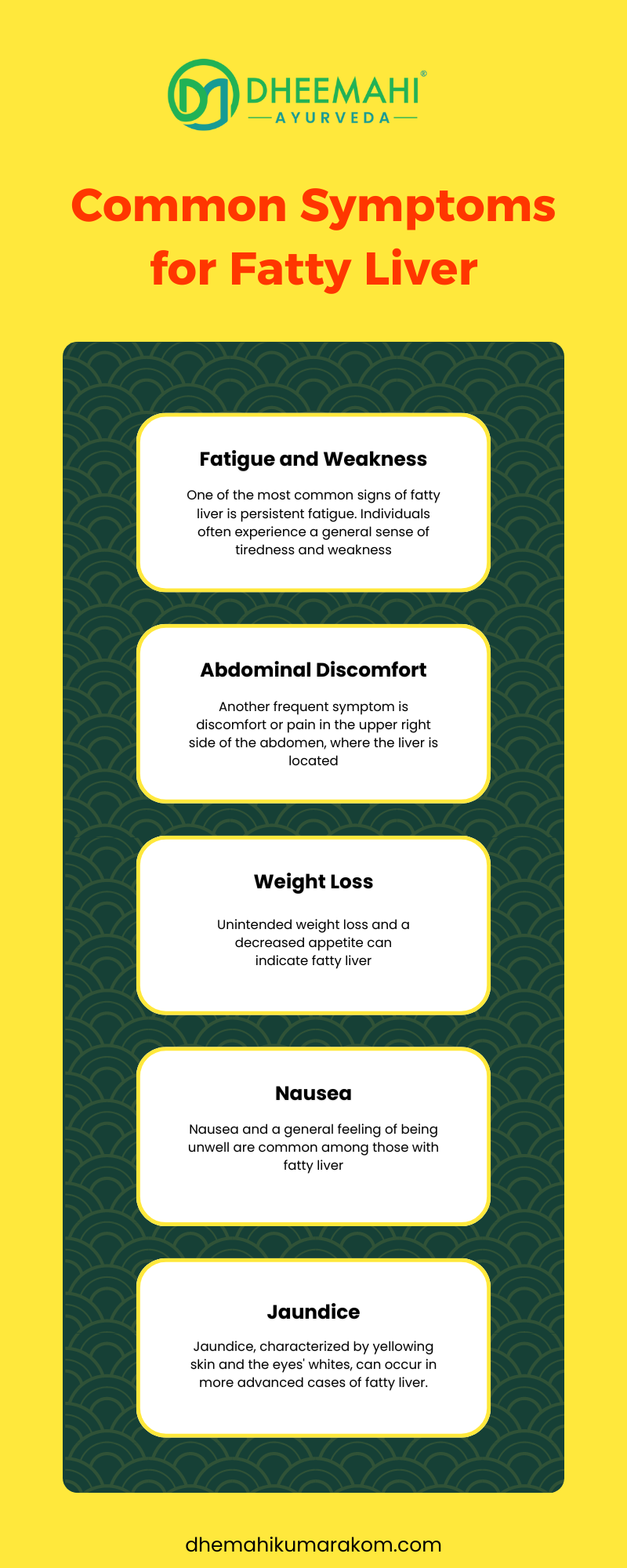Signs, Causes, and Remedies for Fatty Liver through Ayurveda?
Dr. Amritha B.A.M.S
Fatty liver, also known as hepatic steatosis, is a condition in which excess fat builds up in the liver. If left untreated, this can lead to inflammation and liver damage.
In Ayurveda, Fatty Liver is primarily caused by an imbalance in the Pitta and Kapha doshas. Pitta governs digestion and metabolism, while Kapha relates to the structure and lubrication of the body. An imbalance in these doshas can lead to toxins (ama) and fat accumulation in the liver.
Common Signs for Fatty Liver
Fatigue and Weakness
One of the most common signs of fatty liver is persistent fatigue. Individuals often experience a general sense of tiredness and weakness, which can interfere with daily activities and result from a decrease in the liver’s efficiency in processing nutrients and toxins.
Abdominal Discomfort
Another frequent symptom is discomfort or pain in the upper right side of the abdomen, where the liver is located. This discomfort can range from mild to severe and may be constant or intermittent.
Weight Loss and Loss of Appetite
Unintended weight loss and a decreased appetite can indicate fatty liver. The liver’s compromised function can affect digestion and nutrient absorption, leading to these symptoms.
Nausea
Nausea and a general feeling of being unwell are common among those with fatty liver. This symptom can be particularly pronounced after eating, as the liver struggles to process the nutrients and fats from food.
Jaundice
Jaundice, characterized by yellowing skin and the eyes’ whites, can occur in more advanced cases of fatty liver. It happens when the liver cannot effectively process bilirubin, a byproduct of red blood cell breakdown, leading to its accumulation in the body.
Swelling (Edema)
Edema, or swelling in the legs and abdomen, can be a sign of fatty liver. This occurs when the liver’s ability to produce proteins, such as albumin, is impaired. Albumin helps regulate fluid balance in the body, and its deficiency can lead to fluid accumulation in tissues.
Dark Urine
Dark-colored urine can indicate liver dysfunction. This symptom often accompanies jaundice and is caused by excess bilirubin being excreted through the kidneys. The urine may appear dark brown or tea-colored.
Itchy Skin
Itchy skin, or pruritus, can occur with fatty liver disease. This symptom is often caused by bile salt accumulation in the skin due to impaired liver function. The itching can be localized or widespread and range from mild to severe.
Causes of Fatty Liver
There are two primary types of fatty liver disease:
- Alcoholic Fatty Liver Disease (AFLD)
- Non-Alcoholic Fatty Liver Disease (NAFLD)
1.Alcoholic Fatty Liver Disease (AFLD)
AFLD is caused by excessive alcohol consumption, which disrupts the normal metabolism of fats in the liver, leading to fat accumulation.
2.Non-Alcoholic Fatty Liver Disease (NAFLD)
NAFLD is not related to alcohol consumption and is associated with various metabolic risk factors:
Obesity: Excess body weight is a significant risk factor for NAFLD.
Insulin Resistance and Type 2 Diabetes: Insulin resistance can lead to increased fat storage in the liver.
Metabolic Syndrome: This includes a combination of conditions, such as high blood pressure, high blood sugar, excess abdominal fat, and abnormal cholesterol levels.
Diet: High intake of sugar, refined carbohydrates, and saturated fats can contribute to fat accumulation in the liver.
Genetics: A family history of fatty liver disease can increase the risk
Medications and Toxins: Certain drugs and toxins can lead to liver fat buildup.
Remedies for Fatty Liver through Ayurveda
Ayurveda offers a comprehensive approach to managing fatty liver disease through natural remedies, dietary changes, lifestyle modifications, and detoxification therapies. By addressing the root cause of the imbalance and promoting overall health, Ayurvedic treatments can help restore liver function and reduce fat accumulation, bringing a sense of harmony and balance to the body.
Detoxification Therapies
Panchakarma, the Ayurvedic detoxification therapy, is highly effective in treating fatty liver disease. Specific Panchakarma procedures for liver health include:
Virechana (Purgation Therapy): This helps eliminate toxins from the liver and intestines, balancing Pitta dosha.
Basti (Medicated Enema): Basti helps cleanse the colon and balance the doshas, particularly Vata
Abhyanga (Oil Massage): Regular oil massages with herbal oils improve circulation and lymphatic drainage and aid in detoxification.
Swedana (Herbal Steam Therapy): Induces sweating to eliminate toxins through the skin and improve liver function.
Dietary Changes
A balanced diet is crucial for managing fatty liver. Ayurvedic dietary recommendations include:
Eat Fresh and Light Foods: Incorporate fresh fruits, vegetables, whole grains, and legumes into your diet.
Avoid Heavy, Oily, and Processed Foods: These can aggravate Kapha and contribute to fat accumulation.
Include Liver-Friendly Foods: Foods like leafy greens, bitter vegetables (bitter gourd, fenugreek), and herbs help detoxify the liver.
Use Healthy Fats: Include moderate amounts of healthy fats like ghee and olive oil, which are more accessible for the liver to process.
Stay Hydrated: Drink plenty of water and herbal teas to help flush out toxins.
Lifestyle Modifications
Lifestyle changes are vital in managing fatty liver disease. Ayurveda emphasizes the importance of routine and balance.
Regular Exercise: Engage in regular physical activity, such as walking, yoga, or swimming, to help reduce fat accumulation and improve overall health.
Stress Management: Practice stress-reducing techniques such as meditation, deep breathing exercises, and yoga to maintain a balanced state of mind.
Adequate Sleep: Ensure you get 7-8 hours each night to support liver function and overall well-being.
Avoid Alcohol and Smoking: These habits can further damage the liver and should be avoided.
Fatty Liver Ayurvedic Treatment in Kerala
Kerala is home to numerous renowned Ayurvedic treatment centres specializing in managing liver conditions, including fatty liver. These centres provide personalized treatment plans based on the individual’s constitution (Prakriti) and the nature of their condition.
We offer a unique blend of traditional healing practices and serene natural settings, making it an ideal destination for those seeking Fatty Liver Ayurvedic Treatment in Kerala.
At Dheemahi Ayurveda, we are committed to advancing patient health and well-being through a team of experienced doctors and traditional Ayurvedic principles. Our approach involves regular consultations, consistent follow-up check-ups, and active doctor supervision during therapeutic sessions, especially for chronic conditions.
One of our notable strengths is our recognition of the interdependence of mental and physical well-being, emphasizing the significance of the mind in achieving a healthy life.
We take pride in integrating the wisdom accumulated over five generations with contemporary healthcare practices, resulting in a comprehensive and tailored approach to patient care, ensuring you feel reassured and well-cared for.
Our meticulous documentation of treatment schedules adds a layer of transparency and accountability to our healthcare process. At Dheemahi Ayurveda, we are unwavering in our commitment to delivering authentic and effective Ayurvedic treatments while ensuring that these treatments are personalized to meet each patient’s unique needs.
For those looking for the best Ayurveda resort in Kerala, Dheemahi Ayurveda stands out with its commitment to holistic health and personalized care.
How Our Booking Process Works
The unique approach involves a series of discussion during your initial decision-making process to make sure that we will be able to match your expectations with our treatment.
Based on the discussions with you our team of expert doctors will design the best treatment package personalized for your needs.
01
Consultation Form
Fill out our consultation form, and let us know when will you be available for our doctor to talk to you
02
Discussion with Doctor
Discuss your health condition and expectations with our doctor.
03
Booking Confirmation
Confirm the booking by making a payment of 50% advance.
Consultation Form
Submit this form to initiate a booking with us
Have any queries? We will help you. Talk to us now
Say Goodbye to Health Woes & Hello to Healthy Living
Dheemahi Ayurvedic Pvt Ltd
12/386 Varaputhara Road
Kumarakom, Kerala, India
Pin 686563
Dheemahi Ayurvedic Centre, Near Neelimangalam Bridge, Kumaranaloor, Perumbaikad.P.O, Kottayam, Kerala, India, Pin 686016
Other Treatments
Karkidaka Chikilsa | Ayurvedic Treatment for Depression | How to Reduce Stress Naturally | Autoimmune Disorders | Mental Health Ayurvedic Treatment | Weight-Loss Treatment | Frozen Shoulder Ayurvedic Treatment | Diabetes Ayurvedic Treatment | PCOS Ayurvedic Treatment | Celiac Disease Treatment | ayurvedic treatment for skin diseases | nervous system ayurvedic treatment | Back Pain Ayurvedic Treatment | Cervical Spondylitis Ayurvedic Treatment | ayurvedic treatment for blood sugar | Fatty Liver Ayurvedic Treatment | Knee Pain Ayurvedic Treatment | Migraine Ayurvedic Treatment | Osteoarthritis Ayurvedic Treatment | Psoriasis Ayurvedic Treatment | Sinusitis Ayurvedic Treatment | Ayurvedic Detox Treatment | Migraine Ayurvedic Treatment | Ayurvedic Treatment for Rheumatoid Arthritis | Ayurvedic treatment for joint pain | Ayurvedic treatment for ulcerative colitis | Panchakarma Treatment |


